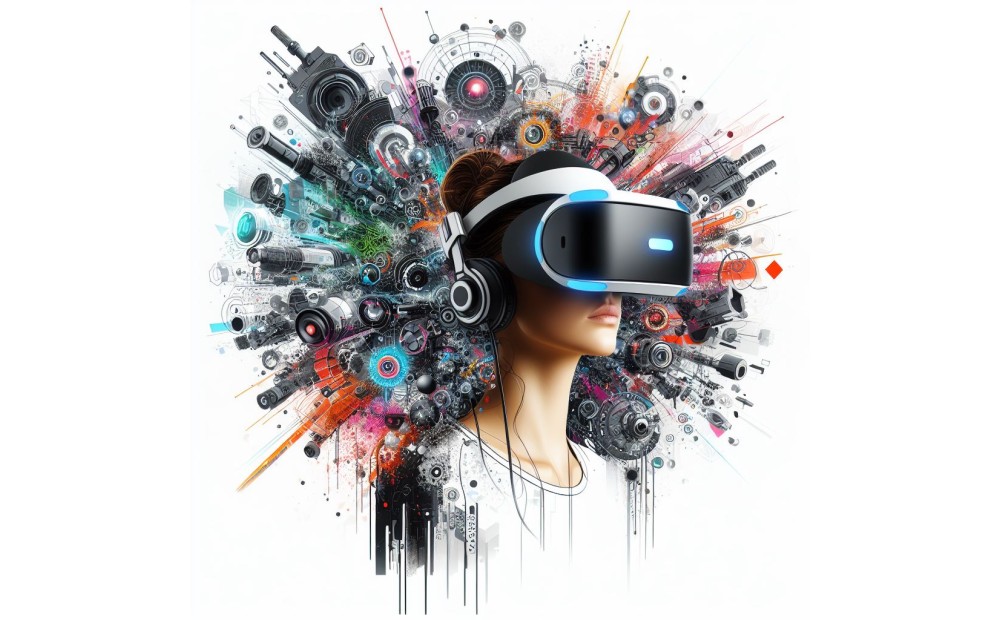Immersive Worlds: Exploring the Latest in Virtual Reality Technology
Introducing the power of virtual reality in the virtual world
Virtual reality VR is one of the immersive technologies that have achieved significant progress in recent years impacting several sectors like entertainment, education, and healthcare. VR development has taken rapid strides, making the technology more approachable and refined to create a wide spectrum of applications and innovations. VR technology has the potential to revolutionize how we engage with digital content and is being used across numerous industries, such as gaming, learning, and healthcare among others.
VR technology ushered in digital experiences of a completely new magnitude with far-reaching effects on diverse industries. VR technology continues to become more developed by the day, promising previously unknown levels of engagement and interactive ability; however, some challenges must be approached with caution as we integrate this fascinating new paradigm into our lives and businesses.
In this blog post, we will delve into the latest development of virtual reality technology; which includes the VR creation stage and experiences associated with it virtually in several fields especially gaming for example Xbox 360 Kinect
Virtual Reality Experiences
Virtual reality is becoming increasingly prevalent, in industries. One area where it has made strides is education, where it has been employed to create simulations and interactive learning environments. Similarly, the medical field has embraced VR for purposes, such as pain relief and interventions for health issues.
Moreover, VR finds applications in entertainment and leisure activities, such as gaming and virtual theme park experiences. It also plays a role in settings by simulating real-life scenarios and enabling learning materials.
In the healthcare sector, VR has proven valuable for uses like managing pain treating phobias, and addressing health concerns. Additionally, VR technology has transformed the tourism industry by offering experiences that allow travelers to embark on tours and gain insights, into different cultures without physically traveling.
.
VR Gaming and Entertainment
Virtual reality gaming has made a significant contribution to the entertainment industry, altering how people spend their leisure hours. VR has been used in various areas like playing games, interactive narration, and virtual amusement parks. VR provides consumers with immersive and engaging experiences.
Virtual reality gaming has evolved the way we consume content by providing users with a more interactive and actionable experience. Companies such as Apple have also released high-end VR headsets that enhanced the experience of gaming with these devices. Therefore, for various recreational and entertainment purposes like interactive storytelling, virtual field trips, cultural events, etc, VR has been used.
Latest VR Headsets and Innovations
The most modern VR headsets offer new technologies, such as light field displays and holographic telepresence, thus increasing the authenticity of virtual experiences. Companies such as Oculus and HTC Vive have led the way in this technology boom, driving further advancement of virtual reality. New developments in VR make it possible for users to achieve more realistic and immersive environments Innovative technologies like light field displays, and holographic telepresence have the potential to transform different economies including gaming, education factors; healthcare sectors, and architecture.
VR Applications in Various Industries
Virtual reality has been an adopted technology in many fields, such as training and simulation healthcare. 3D printing has altered the way people work and study by facilitating co-creating design and engineering applications, replicating medical practices, and providing immersive training sessions.
Medications
VR has been widely used in the healthcare sector for many purposes, like pain management therapy and surgical training. Better surgical outcomes are realized when surgeons practice challenging procedures in a simulated environment. VR has also been used as a means of physical and cognitive therapy in addition to reducing patients’ pain during medical procedures.
Real Estate
Real estate virtual reality, which allows potential buyers to virtually tour properties, has revolutionized the real estate industry. Such technology makes it possible now to inspect properties virtually without even physically visiting them, saving precious time and money. In terms of 3D immersive experiences for real estate marketing, companies like Matterport have pioneered the lead.
Architecture and Design
VR has been embraced by architects and designers, to visualize and experiment with their creations. VR allows professionals not just to view the visual aspects of their designs but also to feel their spatial and sensory elements, allowing them a more wholesome understanding of how they will look in reality. More efficient design processes have ensued, as well as improved dialogue with clients and stakeholders.
Education and Training
In education, VR has been employed to develop immersive learning experiences for learners whereby they can interact with educational content more interactively and memorably. In addition, VR has played important roles in training involving simulated flight for air pilots and practical applications of various trades. This technology might be able to transform conventional teaching practices and enhance the retention of knowledge.
Media and Entertainment
Virtual reality (VR) has had great effects on the entertainment industry by offering immersive experiences in 360–degree movies and interactive stories. Firms such as Disney have also used VR to provide unique entertainment experiences, such as virtual red-carpet events and insider interviews. Virtual reality(VR) also has the potential to transform how media content is produced through its offering of new ways audiences can interact and influence narrative.
Future Trends and Opportunities
Virtual reality (VR) and other immersive technologies hold promise in the coming years. VR in particular has the potential to revolutionize industries, including healthcare, education, engineering, architecture, and tourism. However along, with these opportunities come challenges that need to be addressed. Privacy concerns and the possibility of addiction are issues that must be carefully considered when it comes to technology.
In conclusion
Virtual reality (VR) technology provides numerous benefits to various sectors including healthcare, education, etc. The near future of VR and other immersive technologies has great potential, and there are several areas in which further research can be done to improve the current technology.
However, these possibilities also bear certain perils such as the need to deter potential addiction risks associated with immersive technologies and privacy issues. Moving forward, stakeholders should join forces to address these challenges and ensure that VR is used sustainably and ethically. Doing so will enable us to exploit fully the revolutionary power of virtual reality technology in delivering truly immersive, captivating, and beneficial experiences for all sorts of purposes.






